We’ve all heard how artificial intelligence (AI) is poised to transform finance and accounting. What you need to turn your focus on is generative AI, a subset of AI focused on autonomous content creation. It’s gaining traction in the finance and accounting landscape, and as a leader in this field, it’s crucial for you to understand and utilize the potential of gen AI for financial reporting and other key processes.
Gen AI applications in finance and accounting
Gen AI is already making waves in the industry by:
- Automating tasks and generating financial reports
- Enhancing data analysis and compliance
- Improving efficiency in ESG reporting and auditing
As David Wood, Glenn D. Ardis Professor at Brigham Young University, emphasized, “Companies need to start playing with generative AI…They need to start seeing use cases and discussing it and putting budget aside to explore this or they will be replaced.”
The evolution of technology in finance
CFOs and controllers have been at the forefront of digital transformation:
- Implementing robotic process automation (RPA) for repetitive tasks
- Automating financial reporting processes
- Utilizing machine learning for XBRL® tagging and anomaly detection
Research by Nerissa C. Brown, Professor at University of Illinois at Urbana-Champaign, et al. suggested that AI use correlates with more accurate management earnings forecasts. Auditors are also leveraging AI to analyze entire transaction populations.
The future of AI in finance and accounting
Jeremy Ham, Director of Product Management at Workiva, stated, ”The adoption of generative AI in finance and accounting will lead to smarter decision-making, enhanced productivity, and a competitive edge in the marketplace.” As gen AI continues to evolve, it will play an increasingly crucial role in creating narratives, images, and videos for financial and ESG reports.
To stay competitive, finance leaders must embrace AI technologies, balancing innovation with careful implementation to ensure accuracy, compliance, and ethical use.
How CFOs can balance risk and opportunities in generative AI
Gen AI offers significant potential for accounting and finance professionals in accelerating tasks like drafting annual reports. This allows focus on more complex issues requiring skilled and experienced expertise. However, risks exist, including AI hallucinations and inaccuracies. To maintain credibility, you can’t take your hands off the wheel. While impressively advanced and near life-like in their responses, generative AI tools have been known to hallucinate, or make up answers. That’s where you come in.
It’s recommended to treat AI chatbots as assistants, with thorough review and oversight of outputs. A colleague of Professor Brown, Assistant Professor Abigail Zhang, noted, “Start early, but be cautious…first movers in adopting generative AI can have a competitive advantage.”
CFOs should prioritize internal uses of AI for financial reporting, such as:
- Preparing initial drafts of earnings announcements
- Analyzing key terms in a debt agreement
- Roll forward MD&A
- Generating a numbered outline about a provided topic
- Generating potential analyst questions based on an MD&A excerpt
- Debt agreement analysis
- Bilingual accounting impact analysis
However, skilled team members should review AI outputs before external publication. Remember, AI models rely on historical data, not real-time information. The quality of outputs depends on specific, contextual prompts.
Transforming accounting and finance processes
For gen AI to be truly valuable in finance, accounting, and auditing, it must understand domain-specific nuances. This requires training with specialized data making domain specific data available to an LLM through techniques such as retrieval augmented generation (RAG). Some companies are already experimenting with ChatGPT for summarization and presentation drafting.
Workiva has enabled 300 customers to test gen AI for financial reporting within its platform. Jeremy emphasized, “We are prioritizing finding ways to help our customers apply generative AI to their use cases.”
While AI may not always produce perfect content, it can significantly reduce the burden of creating initial drafts. As Abigail noted, “As long as these tools are better than our older approach, then that is OK.”
The future of gen AI in finance and accounting
AI is unlikely to replace higher-level finance and accounting jobs soon. Kara Stein, PCAOB Board Member, stated, “Technology or computer-assisted analysis is a tool that can enhance, but cannot replace, professional skepticism and professional judgment.”
As gen AI continues to evolve, finance leaders must balance innovation with careful implementation to ensure accuracy, compliance, and ethical use in financial reporting and beyond.
Best practices for generative AI in accounting and finance
To leverage gen AI’s potential while mitigating risks, consider these best practices:
- Prioritize data security and privacy
- Have human experts review AI-generated content
- Start with content creation tasks, and use traditional machine learning for quantitative analysis
- Provide specific, contextual prompts for better results (proper prompting is a skill in and of itself)
- Use industry-specific gen AI tools for accounting, finance, risk, and ESG teams
While generative AI can boost productivity, it’s not a cure-all. Your teams’ expertise remains crucial in making gen AI truly effective.
To stay ahead, finance leaders should:
- Invest in AI literacy for their teams
- Develop clear guidelines for gen AI use in financial processes
- Regularly assess gen AI tools for accuracy and compliance
- Collaborate with IT and data science teams to optimize gen AI implementation
- Ensure the tool or tools they bring onboard are secure, and keep the data they need to keep private, private
By embracing gen AI responsibly, finance professionals can drive efficiency, improve decision-making, and deliver greater value to their organizations.
The CFO’s office can leverage gen AI for:
- Financial forecasting and analysis
- Risk management
- Automated reporting
- Fraud detection
- Cost optimization
- Regulatory compliance
- Scenario planning
- Enhanced customer interactions
- Investment analysis
- Employee training
Balancing rewards and risks
The benefits of gen AI for financial reporting outweigh internal risks. However, users must be trained to critically evaluate AI-generated content. Effective prompting and editing skills are crucial for leveraging gen AI in reporting processes.
By understanding these aspects, finance professionals can harness gen AI’s potential while mitigating associated risks, ultimately enhancing efficiency and accuracy in financial reporting and analysis.





























